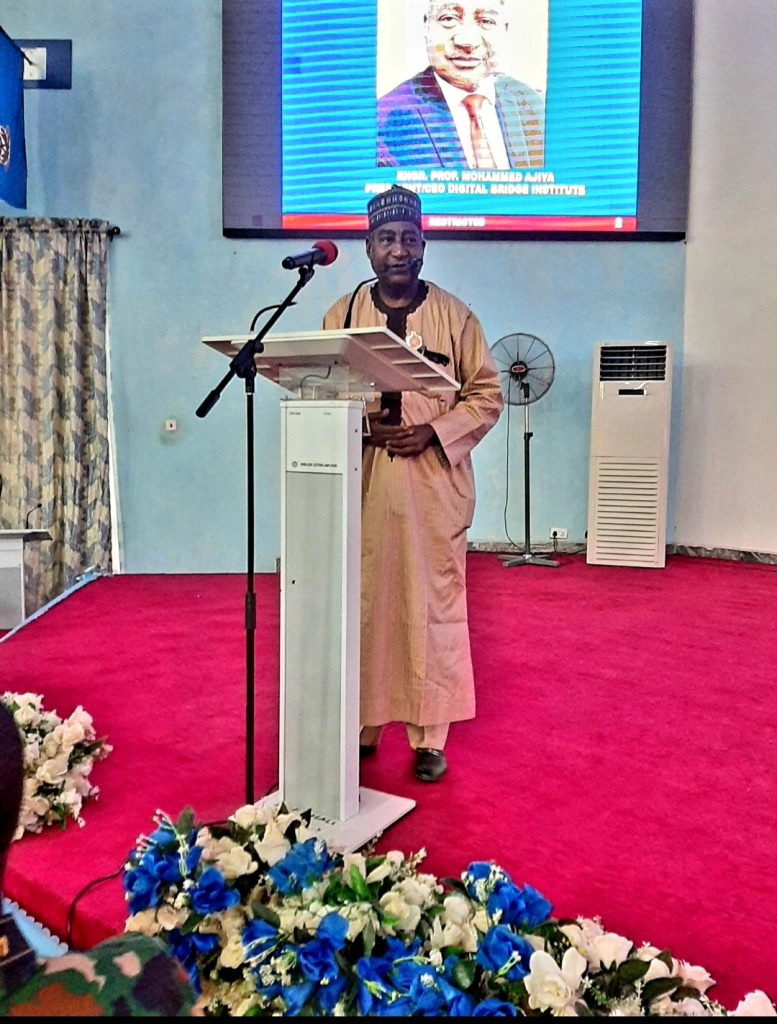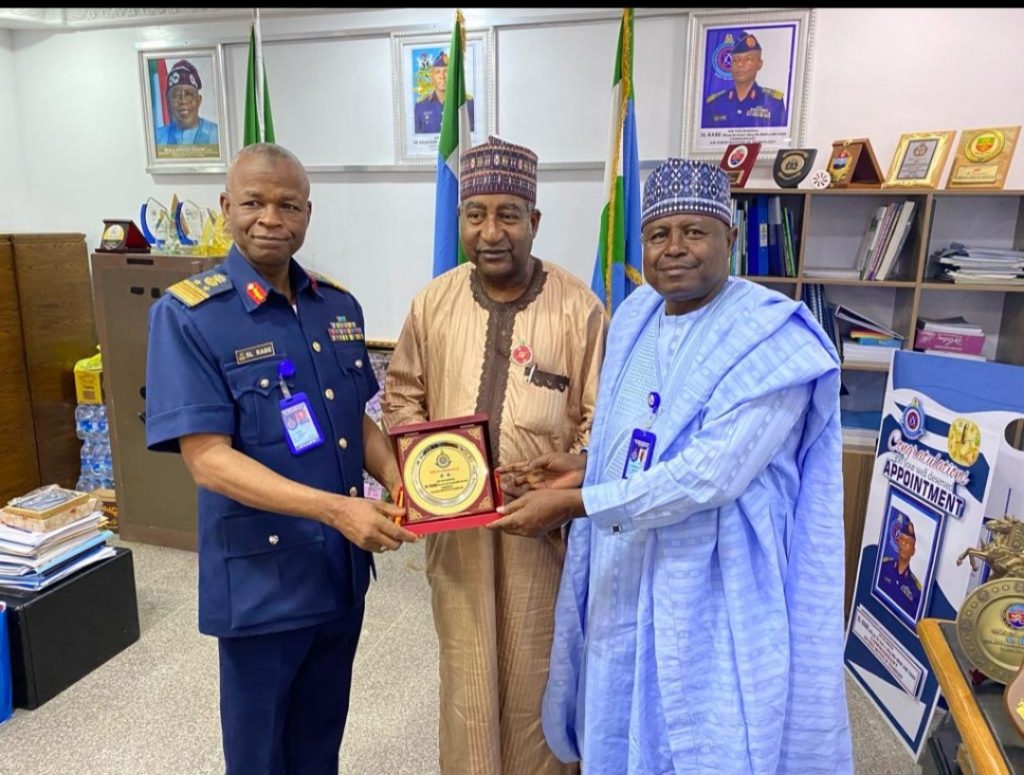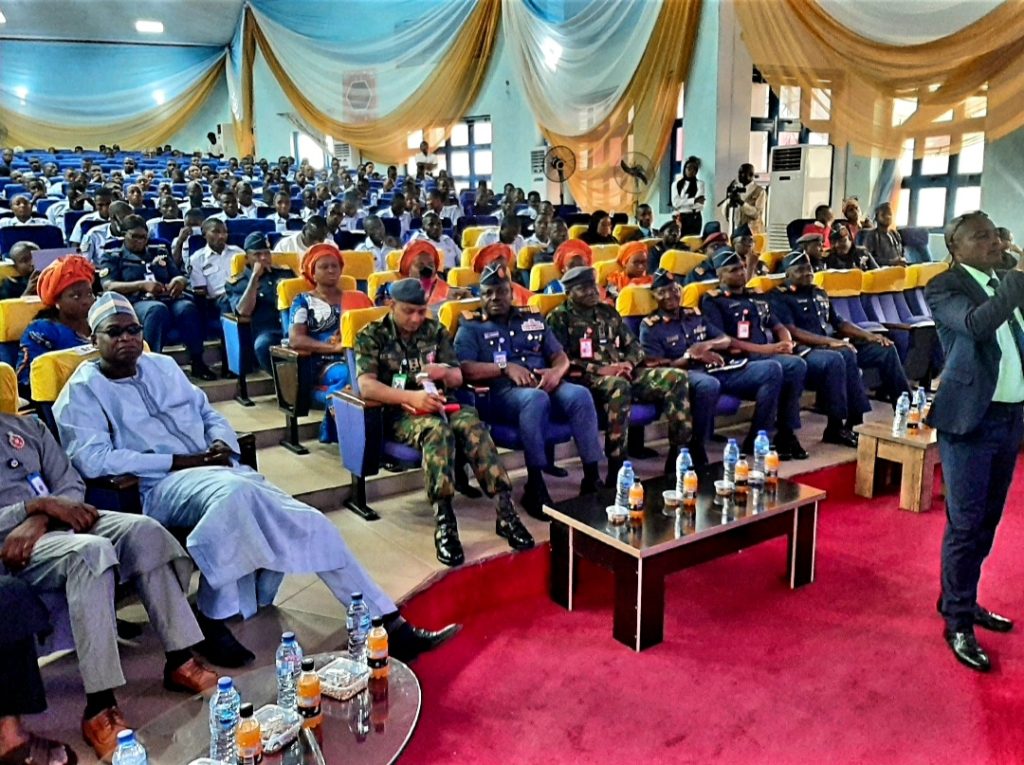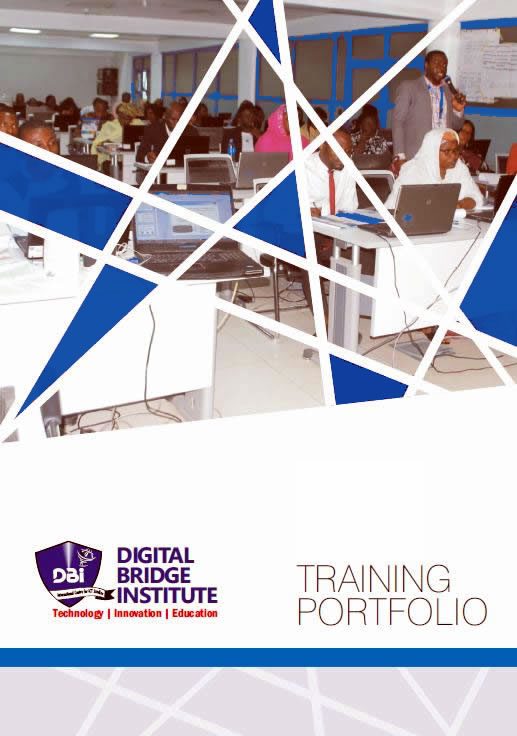

The President/CEO, Digital Bridge Institute, DBI, Engr. Prof. Mohammed Ajiya on Monday, 11th December, 2023 said the adoption and use of emerging technologies will continue to drive the Renewed Hope Agenda of the present administration led by President Bola Ahmed Tinubu. Ajiya stated this when he delivered a paper at the Maiden Public Lecture organized by the Air Force Institute of Technology (AFIT), Kaduna, on the topic: Leveraging Technology Capacity to Achieve Renewed Hope Agenda.
In his paper, Professor Ajiya stated that Nigeria’s potential can be further developed and maximized if there are coordinated and concerted efforts among stakeholders in the tech ecosystems. He further stated that Nigeria’s current tech expertise can be seen in the rapid growth in the financial technology and eCommerce sector evidenced by the enviable achievement of having 4 out of the current 7 tech Unicorns in Africa, namely Interswitch, Andela, Flutterwave, and OPay. Senegal has one Unicorn, Wave. So also, Ghana/Uganda with Chipper Cash and Egypt with MNT Halan. A Unicorn is a start-up that is valued at $1 Billion and above.
In his presentation, Professor Ajiya reiterated that Nigeria has the largest telecommunication market in Africa and one of the fastest-growing telecommunications sectors in the world and that the current market share and subscriber base of the different operators in this market stands at MTN, 85,005,917 (38.51% ), Airtel 60,169,082 (27.26% ), Globacom 61,395,108 (27.82%), 9Mobile 13,791,079 (6.25% ), Fixed Wire/Wireless 96,796 (0.04%) and VoIP 257,979 (0.12%) as at August 2023.
He stated further that the Market Share by Generation, 2G (60.32%), 3G (10.78%), 4G(28.07%), and 5G (0.83%) and Active Internet Subscription as follows GSM – 158,475,341, Fixed Wire – 17,157, ISP – 208,612 and VoIP -333,607. The contribution of the Telecommunication Industry to the Gross Domestic Product (GDP) at the end of quarter 2 in 2023 is 16.06% while that in quarter 3 of 2023 dropped to 13.50%. He believes the growth in Nigeria’s telecommunication market portends a bright future for the nation if the right capacity is built.
Prof. Ajiya took the audience down memory lane by saying “Acknowledging the need to foster the rapid development and growth of the Nigerian technology ecosystem, as well mitigate significant vulnerability that shortage of human resources could pose, the Nigerian Communications Commissions (NCC) established DBI – in May 2004 with the main mandate of human capacity building, skilling and up-skilling.
Today, DBI is the foremost government-affiliated training and human capacity development organization in ICT in Nigeria, training more than 10,000 participants yearly. The Institute is one of only 14 global International Telecommunications Union (ITU) Academy Training Centre (ATC). DBI also has strategic alliances with global players in technology training such as ICDL, Cisco, Microsoft Academy, GSMA, Huawei, CTO, and many more.
“In addition to DBI’s mandate to build capacity within the ICT sector, the Institute is also charged with building ICT capacity and digital literacy within all sectors in the nation. Since its establishment, the Institute has trained over 120,000 participants from over 300 corporations, MDAs, educational institutions, and the public. DBI has a well-equipped campus in each of the 6 geo-political zones of the federation.”
He added that “the Government of the Federal Republic of Nigeria has continuously put in place policies and frameworks to leapfrog digital transformation in Nigeria. According to him “The Policies have helped to promote innovation and co-prosperity. Such policy frameworks include the National Digital Economic Policy and Strategies 2020 – 2030; the National Policy on 5th Generation Networks for Nigeria’s Digital Economy, The Nigeria National Broadband Plan 2020 to 2025 among others including the blueprint of the current Honourable Federal Minister of Communications, Innovation, and Digital Economy, Dr. Bosun Tijani who in October 2023 has rolled out a roadmap titled “Accelerating our Collective Prosperity through Technical Efficiency”. The blueprint is anchored on five pillars which are Knowledge; Policy; Infrastructure; Innovation, Entrepreneurship and Capital; and Trade. These represent a common commitment to uplifting our nation through digital transformation, innovation, and economic growth to drive inclusive growth and develop our digital economy.
Presently the Ministry has kickstarted the first phase of the plan of training of 3 million Nigerians in selected knowledge areas of ICT. The program is titled 3MTT (Three Million Talent Training). The 3MTT is a critical part of the 8 points of the Renewed Hope agenda, aimed at building Nigeria’s technical talent backbone to power the digital economy and position Nigeria as a net tech-talent exporter. This strategic blueprint is aimed at promoting innovations and co-prosperity in the digital transformation ecosystem in Nigeria.
The DBI Boss, while doing justice to the topic, said Nations that have leveraged the prevailing technology at different stages of human development have stayed ahead of their peers in global ranking and consequently ushered in development for their citizens. Ajiya highlighted the 8 priority areas of the Renewed Hope Agenda of the Federal Government as Food Security; Ending Poverty, Economic Growth and Job Creation, Access to Capital, Improving Security, and Inclusivity:
However, some of the conditions necessary for the growth of Technological Innovation, according to Ajiya are, the presence of digital literacy, advanced digital skills, and/or opportunities to upskill: Ready availability of required infrastructure: Ready availability of required tools, Proximity to a collaborative like-minded community, Access to funding and Supportive government policies.
Going further in his lecture, Ajiya reviewed two technologies that he believed would shape the future of technology, 5G and optical fiber network. He stated that “Federal government, as a matter of deliberate policy, should empower specialized institutions like DBI, AFIT, and the universities to play a critical role as drivers of research, innovation, business, entrepreneurship, and technology. Institutions are recognized for promoting the diversity of ideas and critical thinking, to always advance the frontiers of human knowledge.
He said the Federal Government can look at measures akin to the initiatives of nations like Estonia and India which have adopted accelerated tech capacity-building measures. For example, Estonia’s implementation of the e-Estonia initiatives has made the country the start-up capital of Europe with the deployment of innovative digital technology systems and applications that have transformed the digital landscape in the country and for export. Estonia has successfully leapfrogged its development and digital transformation to become an industry leader among several bigger nations in a competitive continent like Europe. Estonia is also ranked as the third fastest-growing technology Center in the Global Startup Ecosystem. Ajiya further gave the example of India, a net exporter of tech talent.
In his paper, he stated that statistics shows that India’s earning from the provision of IT and BPO services globally, stands at US$157 Billion in the fiscal year 2021-22 comprising US$106 Billion from IT services and US$51 Billion of BPO services. Direct employment in the IT and BPO sector is estimated to be about 5.1 million people for 2021-2022 and indirect job creation is estimated at over 12m persons.
In conclusion, he advised that creative engagements between universities, industry, and their host communities are vital for creating a suitable ecosystem for facilitating steady entrepreneurial activities within local and international markets. With globalization, the world has now become more interconnected. He further advised that universities must therefore intensify efforts to develop sufficient skilled human capital required for driving the digital economy and thus achieve the Renewed Hope Agenda of Mr. President, His Excellency, Bola Ahmed Tinubu,” he concluded.
Signed:
Akin Ogunlade
Head, Public Affairs Unit
Digital Bridge Institute
December 13th, 2023

